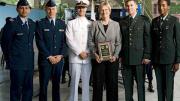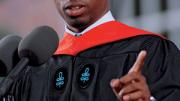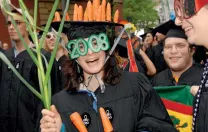America is fighting two wars. Related issues arose twice during the formal Commencement-week activities. President Drew Faust, addressing her first Reserve Officers’ Training Corps commissioning ceremony on June 4, delivered a nuanced, historical analysis of the values guiding the University and the military—and the remaining division between them: the “don’t ask, don’t tell” policy that prohibits service by acknowledged homosexuals. In his graduate English address during the morning exercises the next day, Anthony C. Woods explained the effects of his personal journey from Iraq to the Harvard Kennedy School, from which he subsequently received his M.P.P. degree. Excerpts follow; complete texts and audio recordings appear at www.harvardmag.com/commencement.
“Principles We Must Strive to Extend”
You have our respect for your choices, our admiration for your commitment, and our deep gratitude for your willingness to confront dangers on the nation’s behalf in the months and years to come.
You are part of a glorious and long tradition of military service at Harvard. We are surrounded by memorials to Harvard’s soldiers and officers. Memo- rial Hall commemorates those who lost their lives fighting for the Union in the Civil War—136 of them, honored on the plaques in its transept.…Memorial Church, just behind us, was built in memory of the hundreds who died in World War I, including three Radcliffe women, out of the some 11,000 from Harvard who served with the Allied forces, and we have since added memorials to those who sacrificed their lives in World War II, Korea, and Vietnam. Harvard students and graduates continue to serve as leaders in our nation’s military, still exhibiting courage and self sacrifice, in Iraq, Afghanistan, and around the world. And perhaps few people know that Harvard established one of the very first ROTC programs in the country, formed during World War I….More than 1,000 students joined, and marched through Boston in a show of national “preparedness.”
I celebrate you on this important day, as you join these traditions and vow to support and defend the United States Constitution. The freedoms we enjoy depend vitally on the service you and your forebears have undertaken in our behalf. Indeed, I wish that there were more of you. I believe that every Harvard student should have the opportunity to serve in the military, as you do, and as those honored in the past have done.
Universities like Harvard are special places, places not just where minds can flourish but where hearts are nourished as well—by commitment to the pursuit of truth, to the availability of opportunity based on merit, to the full inclusion of all in our hopes and possibilities.
The United States has long turned to education to nurture the equality fundamental to our national purposes. In 1779, for example, Thomas Jefferson called for a national aristocracy of talent chosen, as he put it, “without regard to wealth, birth or other accidental condition or circumstance,” and “rendered by liberal education…able to guard the sacred deposit of rights and liberties of their fellow citizens.” Education has enlisted the talented—“without regard... to condition or circumstance”—in the service of broader purposes of nation and community.
So too has the military served as a foundation for citizenship and a pathway to full participation in American life. Thousands of immigrants have achieved citizenship as a result of national service…. And it is no accident that Lincoln’s Emancipation Proclamation guaranteed both freedom and the right to military service. As a convention of African-American veterans declared in 1865 as they petitioned for the right to vote, “What higher order of citizen is there than the soldier? Or who has a greater trust confided to his hands?”
As women claimed the full rights and obligations of citizenship in the course of the twentieth century—the right to vote, the right to serve on juries—so too they sought full inclusion in the military. That there is a woman here about to be commissioned as an officer today [Second Lieutenant J. Danielle Williams, U.S. Army]—that I am here as president to address you—is because of the inexorable logic of those principles of inclusion operating “without regard to…accidental condition or circumstance.” These are the principles that have made Harvard what it is, that have made the American military what it is; these are the principles that have made our nation what it is. These are principles we must continue to honor and strive to extend.
“Q&A”
From an address by Anthony C. Woods
We all traveled different paths to Harvard. My journey began in the desert heat of Iraq. Months after graduating as a lieutenant from West Point, I took charge of 17 soldiers and led them to that war-torn country. It didn’t take long for me to confirm that my three hours of Arabic language training weren’t going to get me very far.
Like many of you, I had very serious questions about the legitimacy of this war. These questions grew louder on days when tedium and toil turned into chaos and tragedy.
I remember the 27th of July 2004. Earlier that day, I spoke with 24-year-old Sergeant Deforest Talbert about his two-year-old son. Three hours later, I stood next to his lifeless body and questioned why he made this sacrifice.…
On the 11th of October 2005, my men and I responded to the scene of a suicide bomber who violently ended his life and the lives of 40 others at a local market. I wondered if the media would portray the victims as individuals with families like Sergeant Talbert, or would their fate be presented as a cold statistic?
Harvard is a very long way from Iraq. The army sent me to the Kennedy School in the summer of 2006, and I welcomed the break from the battlefields of the Middle East. At Harvard I found myself engaged in a battlefield of ideas.
Questions shifted from my personal experiences to the universal. Will we reverse the tide of global climate change? Why do we turn a blind eye to genocide and human suffering? Why don’t we commit more resources to scientific research? Why are corporate boardrooms so prone to corruption? Why do we send so many of our children to crumbling schools?
I’m not afraid to admit that I felt helpless in the face of these questions.…But something inspiring happened for me at Harvard. As the list of questions grew, I met more and more talented individuals from all across this University—from all around the world—who were also asking difficult questions. I soon realized that Harvard chose us because we know these questions don’t have easy answers.
These reflections reminded me of the words of a member of Harvard’s class of 1940. John F. Kennedy said, “No problem of human destiny is beyond human beings. Man’s reason and spirit have often solved the seemingly unsolvable, and [I] believe [we] can do it again.”…
Many who came before us…looked upon the world and could have found reason to despair. But, instead of losing hope, they chose to act.
Let us remember the abolitionists. Their legacy calls on us to end slavery and human trafficking in our own time.
Let us remember the scientists. Their eradication of polio and smallpox inspires our effort to cure cancer and HIV/AIDS.
Let us remember those who ended apartheid in South Africa. Their struggle shows us how to stand up for human rights for the citizens of Tibet.
And let us also remember the students who came before us. They fought to end the war in Vietnam and hoped the United States would never again wage a war of choice.
What made all of these generations special was their ability to redefine “Q & A.” Instead of responding to questions with answers, they responded with actions. They left a legacy that calls on us to do the same—we have no choice but to follow their example. And so…fellow students of the class of 2008, I ask one final question: will you take action to respond to the challenges of our day?








